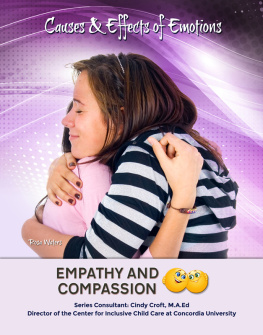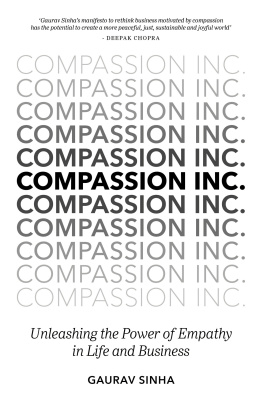Thank you for downloading this Simon & Schuster ebook.
Get a FREE ebook when you join our mailing list. Plus, get updates on new releases, deals, recommended reads, and more from Simon & Schuster. Click below to sign up and see terms and conditions.
CLICK HERE TO SIGN UP
Already a subscriber? Provide your email again so we can register this ebook and send you more of what you like to read. You will continue to receive exclusive offers in your inbox.
For Caroline and Darryl, two of my greatest teachers
Introduction
Empathy is a squishy word. Sometimes its confused with sympathy or misinterpreted as being nice. That isnt empathy. Empathy is about understanding. Empathy lets us see the world from other points of view and helps us form insights that can lead us to new and better ways of thinking, being, and doing.
The words business and empathy are rarely used togetherin fact, for some of us they might even sound oxymoronic, but there are incredible benefits to taking on others perspectives in the context of our professional lives. Thats what Applied Empathy is about. Empathy is not some out-of-reach mystical power. Instead it is a skill that each of us can make a part of our daily practice and ultimately bring into the organizations we serve.
This book presents a set of tools and ideas for applying empathy to:
Understanding your customers needs and improving your products and services by infusing them with rich, meaningful insights gleaned from a newfound perspective.
Connecting and collaborating with your teams more effectivelyunderstanding the skills and styles of each person and how to get the most out of your interactions.
Leading with a new awareness that will undoubtedly aid you in not only understanding others better but, perhaps more important, understanding the truest aspects of your own self.
Applying empathy may seem obvious for one-to-one interactions, and it is a critical part of any good relationship, but its also a powerful advantage when applied at the business level to gain perspective within your companys walls and in the world within which the company operates.
There are countless instances in the business world where companies have missed the opportunity to apply empathy, many of them paying dearly for the oversight.
One of the most infamous was Xeroxs fumbled opportunity to lead the personal computing industry. Back in the 1960s, Xeroxs 914 photocopier revolutionized the business world. At the same time, the companys innovation facility, the Palo Alto Research Center (PARC), was fast at work developing other new and insightful products. One of those was the Xerox Alto, the first fully functional personal computer. It had processing power, a graphic interface, and even a mouse. So why isnt Xerox a computing juggernaut today?
In the 1970s, Xeroxs leadership was largely focused on raking in the massive profits generated by the 914 photocopierwhich was not sold but leased to customers, who were charged per pageinstead of looking out into the world and using empathy to sense the growing demand for personal computing. They didnt do anything with the Alto or, frankly, with many of the other great inventions that PARC was churning out. They were preoccupied with their current successes and uninterested in understanding the shifting consumer needs around them. As a result, they missed one of the greatest technology booms the business world has ever experienced.
Another more recent example of a lack of empathic leadership can be seen in the music industrys inglorious failure to participate in the digital music revolution. While executives stretched their travel and expense accounts to the max and obsessed over CD distribution deals with brick-and-mortar retailers, Napster and LimeWire were hard at work building a completely new, and more empathic, distribution system that aligned with consumers and their needs (though not empathic to the artists or the record industry they were disrupting). Missing that opportunity crushed the major music labels business and gave rise to powerhouses such as Apple Music and Spotify.
Would empathy alone have saved those companies from disaster? Its hard to say. But had they applied empathy more meaningfully in their decision-making, they could have recognized new and innovative ways to lead their businesses into the next era.
Fortunately, plenty of companies are applying empathy to solve tough challenges and lead teams with new and powerful insight.
A darling of the start-up world, Warby Parkers meteoric growth can be closely mapped to its executives clear understanding of the grit in the retail eyewear experience. Consumers werent getting what they needed from any of the big players in the space, and Warby Parkers founders saw an opportunity to jump into the category offering a more human, service-oriented approach that has been voraciously embraced. (Full disclosure: weve worked with them and can attest to their empathic strengths firsthand.)
One of my favorite empathic thinkers is Elon Musk. He truly understands the needs of the market and has proven to be a powerful innovator and entrepreneur who can apply his understanding to a variety of industries. Most recently, hes decided to take on the challenge of soul-crushing traffic. His venture, The Boring Company, is solving this problem in an unexpected way. While everyone from Hollywood moviemakers to Ivy Leagueeducated futurists has spent time imagining a world full of flying cars, Musk has taken his vision to a subterranean level, focusing instead on building a technologically advanced tunneling business designed to solve our increasingly gridlocked roadways by expanding them to the ground below us.
These companies and their leaders understand how to use empathy to look at problems differently and create solutions that not only disrupt conventions but use empathy as a powerful tool.
My own company, Sub Rosa, is a strategy and design studio that works with large, often complex corporations as well as progressive thinkers in government, entertainment, and the start-up world to help them evolve their businesses with empathy. We have worked with some of the worlds most recognizable companies and leaders, and Im proud that those clients have sought us out because we offer fresh solutions that support their need to explore, learn, and grow.
Our clients come to us because we can help them figure out who they truly are, what they are actually trying to accomplish, and, perhaps most important, show them how to take their goals or their businesses to a higher level.
Weve worked with countless CEOs and leadership teams to think differently about how empathy can ignite a spirit of creativity, innovation, and growth in the hearts and minds of their teams around the world.
Weve helped one of the worlds most successful athletes understand himself and his brand with empathygiving him a mission and vision that will take his career to new heights.
We even brought empathy into the West Wing of the Obama White House, applying our thinking to a series of initiatives started by the first family to help bring a greater sense of understanding to our nations indigenous peoples rights and resources.
Empathy lets us better understand the people we are trying to serve and gives us perspective and insight that can drive greater, more effective actions. The seemingly magical quality of empathy is the connection it helps us form with other people. Some of us are born with an overwhelming degree of empathy, while others are callous or even blind to the perspectives of others. The rest of us fall somewhere in between. But empathy is more than just a natural talent; it can also be a process, a learned skill, developed and applied when and where needed.
Next page








